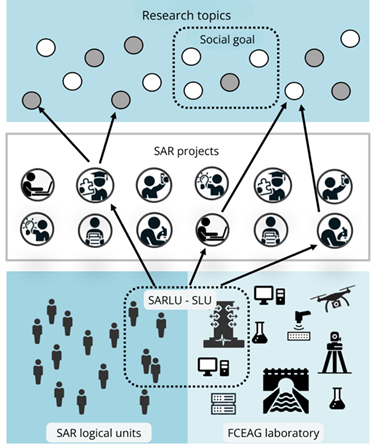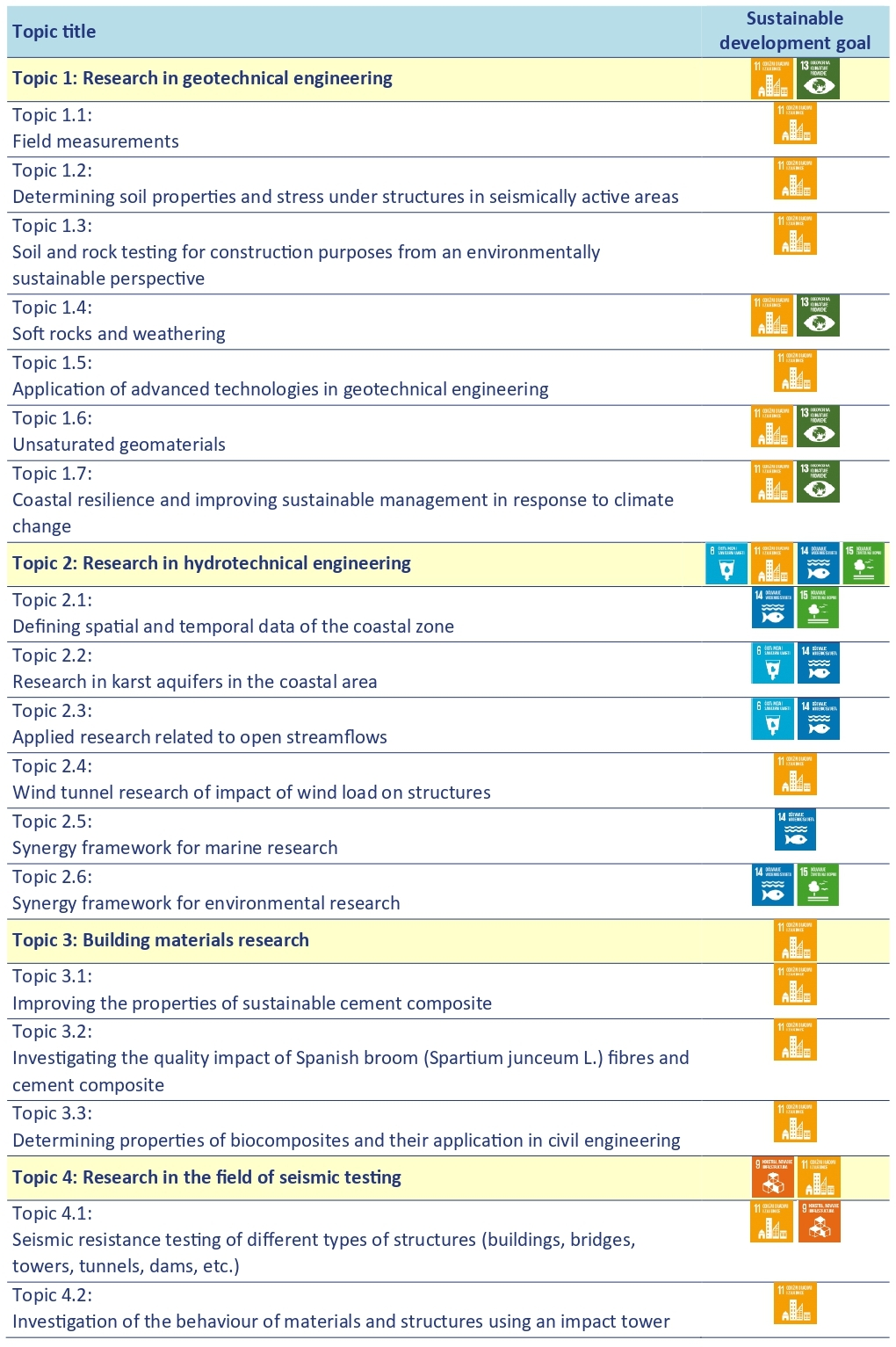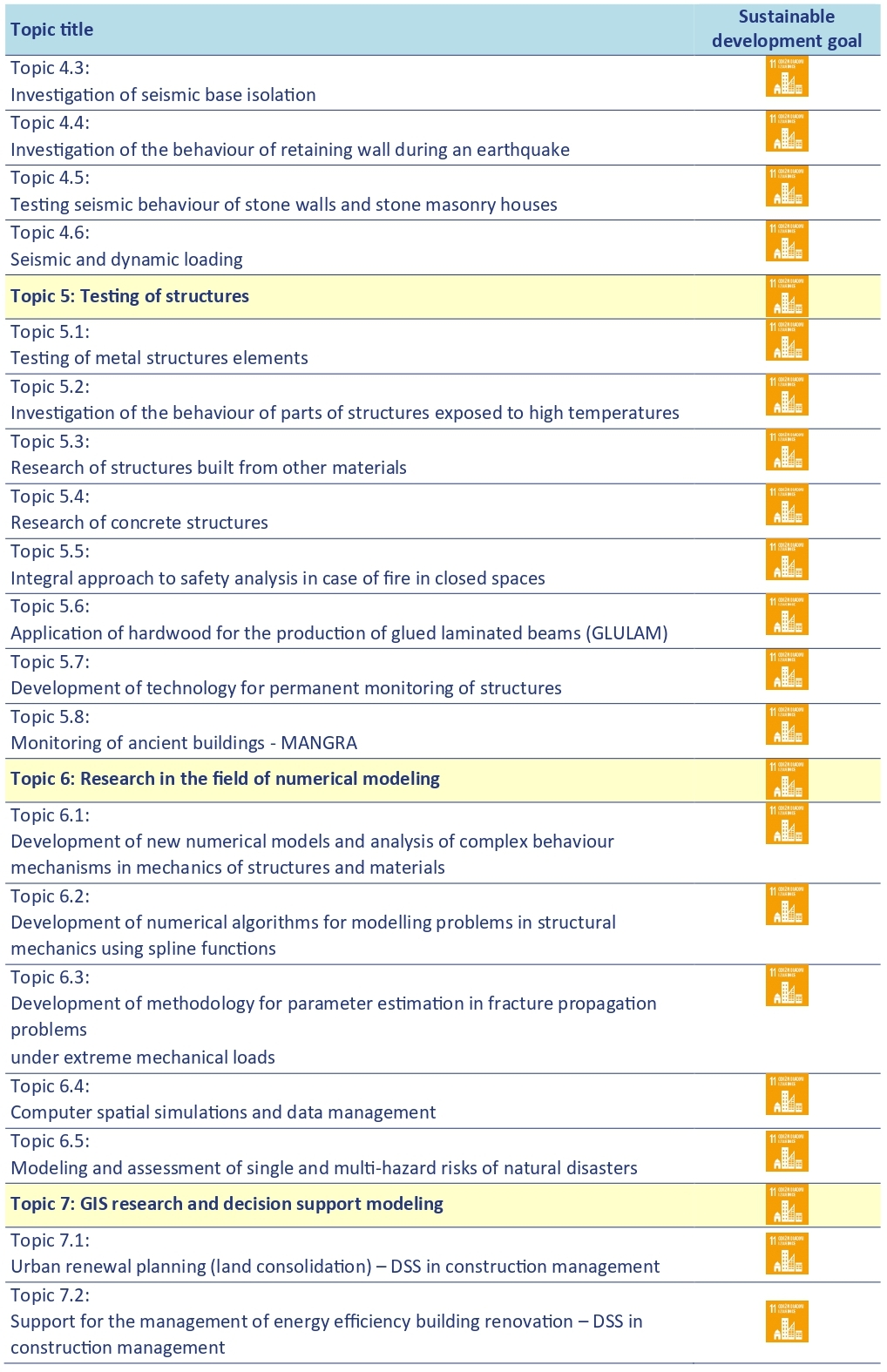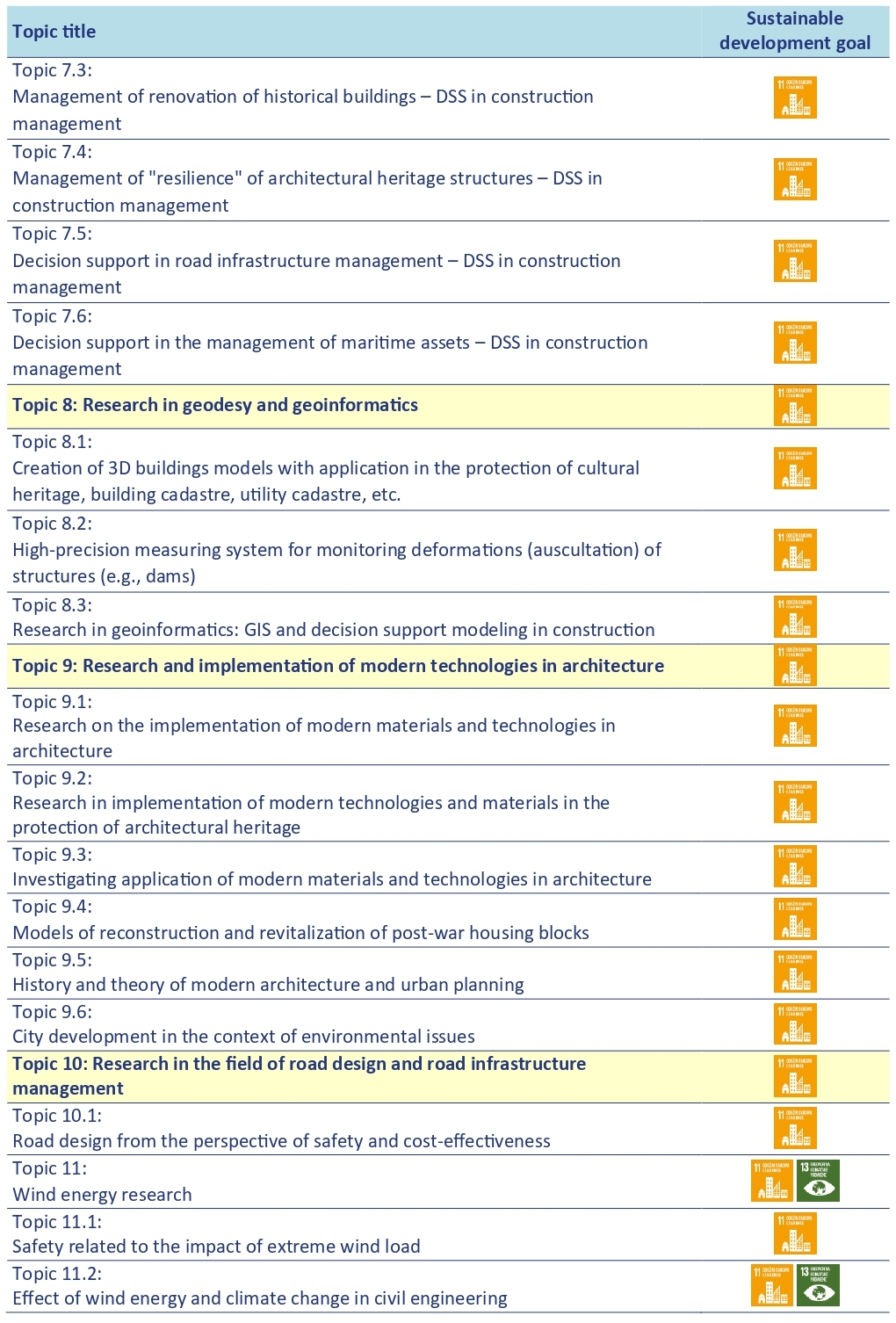Since the establishment of the Faculty in the 1970s, scientific and research activities have been the main driving force behind the development of study programs and the Faculty's scientific and research infrastructure. The scientific recognition of the Faculty in the 21st century is reflected in the development of eleven specialised laboratories equipped with new scientific research equipment worth HRK 40 million, as well as a new organizational scheme in the sense of separating the scientific work of the Faculty as a separate organizational structure.
Previous scientific references in terms of approved scientific projects financed by the European Union and the Republic of Croatia place the Faculty among the leading faculties in the field of technical sciences in Croatia and the region. Scientific work is closely related to the professional work carried out by the Faculty, which resulted not only in the relevance of scientific activity but also in the design and construction of a large number of significant construction facilities and operations, which is why the Faculty represents an institution that is a pillar of professional and scientific excellence in business and economy. After 50 years of activity, the Faculty, in addition to an extremely developed network of researchers in the field of technical sciences, is slowly developing in conducting research in the interdisciplinary field of science, which combines the fields of architecture and geodesy in several different interdisciplinary research topics.
The employees of the Faculty have been involved in the realization of significant international and national scientific and professional studies and projects. A substantial number of scientific articles in the different areas have been published in renowned journals and many lectures and presentations have been given at international congresses. Many lecturers from the Faculty of Civil Engineering, Architecture, and Geodesy have received distinguished national and international awards, prizes, and acknowledgements for their successful scientific, teaching, and professional work. Additionally, many have achieved success in acclaimed architectural competitions. The Faculty of Civil Engineering, Architecture and Geodesy organizes a range of activities such as public, scientific and professional lectures, public discussions and debates, various courses and sports and culture-related activities.
The Strategic Programme of research is adopted to pave the way to the development of scientific research and related activities following the adopted national and EU strategy documents; and all this with the scope of the Faculty being able to plan and successfully achieve its societal role of supporting sustainable development of the Adriatic Region of the Republic of Croatia.
Scientific research strategy of the Faculty of Civil Engineering, Architecture, and Geodesy in the field of Engineering Sciences for the period 2021-2025.
Scientific research strategy of the Faculty of Civil Engineering, Architecture, and Geodesy in the Interdisciplinary field of Sciences for the period 2021-2025.
Mission
FCEAG is a research and teaching constituent unit of the University of Split, with the mission of meeting society's needs in the areas of higher education, scientific, professional, and artistic activities, according to the Faculty Statute and the law. Within the scope of higher education activities, the Faculty organises and offers university-level and professional-level studies that are, in their quality, harmonised with the European higher education standards. Specifically, the learning outcomes attained after completing the study programmes reflect the societal needs and competencies required in the labour market or for the continuation of education. Learning outcomes are in harmony with the Croatian Qualifications Framework (CROQF) and, therefore, harmonised with the European Qualifications Framework (EQF) of the Qualifications Framework for the European Higher Education Area (QF-EHEA). In defining the learning outcomes and objectives in harmony with CROQF, FCEAG always acts according to the professional requirements and internationally recognized standards within a specific profession (i.e., the qualification profile), thus ensuring the offered programs are up-to-date. For the specifically regulated profession of Architecture and Urban Planning, skills and knowledge to be attained through higher education are defined by the EU Directive on the recognition of professional qualifications. In the so-called ‘notification’ process carried out in 2016, the study programs in Architecture and Urban Planning were recognized to have reached a European-level quality.
The Faculty promotes scientific research in engineering sciences in fields related to civil engineering, architecture, geodesy, and geoinformatics in the broadest sense, to address all current issues in these fields. Contemporary societal challenges require interdisciplinarity to further develop and promote ongoing and future scientific research topics at FCEAG.
The Faculty continually strives to participate in internationally competitive European and other projects. In addition to cooperating with the largest companies in the region and the EU, FCEAG also collaborates with local authorities, thus promoting its fundamental role in society (scientific research projects in collaboration with industry stakeholders and similar). One of the general strategic objectives of the Faculty is to gain an international reputation for the quality of its work. For this reason, we encourage our students and teaching staff to become active members of the European and world scientific and teaching community. Therefore, international mobility and cooperation are among the highest priorities, the development of an international scientific journal published by the Faculty, and continuous improvement of doctoral studies to achieve greater internationalization of both studies and research.
Since the Faculty’s primary role is to meet the current needs and goals of society, one of the relevant strategic goals is the promotion of life-long learning in civil engineering, architecture, geodesy, and fundamental engineering sciences within the area of engineering sciences, as well as the field of project management within the interdisciplinary area of science, including all the combinations of previously mentioned civil engineering fields with other thematically cognate scientific fields and areas. Currently, the Faculty has three licensed lifelong learning programs that are subject to continuing modifications and adjustments in line with the present needs and applicable regulations. To achieve all the strategic objectives, the Faculty strives for continual and systematic advancement of all the operational areas: establishing, organisation and management of study programs, increasing efficiency in the educational and scientific research process, linking educational, scientific research and professional activities, as well as capacity building and improving internal organization following ESG standards.
Vision
The Faculty will achieve recognition for its high standards in scientific, research, educational, and artistic activities and the resulting effects on society’s technological and cultural development. The Faculty’s status as a scientific and research institution is reflected in activities focused on accomplishing mandatory, general and specific objectives of the FCEAG Science and Arts Research Projects (11 Faculty projects) that will achieve international reputation in their respective research areas.
The Faculty will become the leading promoter of collaborative research at the regional and national level, involving the industry, the academic community, and state administrative bodies and institutions. Supported by newly equipped laboratories, the Faculty’s teaching staff, researchers, and students shall aim for international recognition within their specific research disciplines, collaboration with other research institutions, and publishing original research. As a result of the INFRA project that enabled modern laboratories equipped with cutting-edge technology, students will be more efficiently included in teaching and research. Access to the European and world research areas will also be facilitated for scientists and researchers. In addition, researchers will gain a competitive advantage among their international colleagues and be more easily hired on demanding projects. At the same time, industry partners, within Croatia and beyond, will be able to conduct targeted and applied research, develop new products, models and services, and test their innovative concepts and technology transfer capabilities.
Increased mobility of teachers and students will contribute to the acquisition of new experiences in education and scientific research, the creation of highly qualified staff for teaching, scientific and artistic activity, allowing adaptability to the labour market requirements within the European Union. The scientific research potential of FCEAG will be adaptable to its increasingly dynamic environment and offer the possibility of modifications and introduction of new high-quality study programs and interdisciplinary studies (and research) pertinent to regional and national development.
In light of the contemporary, 21st-century approaches to education that interpret knowledge through the lens of the research-education-innovation triangle, FCEAG is committed to contributing to the development of all aspects of the knowledge triangle and supporting the partnership between research and business communities to meet the current societal challenges. To maintain the continuity of the abovementioned, in this preparation period, it is necessary to integrate more comprehensively into the European funding schemes (societal challenges) and the national ones (specific strategic goals and/or priority thematic areas and subareas). This implies the development of new scientific research topics at FCEAG in the interdisciplinary field of science.
FCEAG has established a flexible organizational structure adapted to the needs of the European and national funding schemes so that interdisciplinary research topics addressed so far within specific departments can be easily grouped into larger multidisciplinary research teams (also including members from outside the Faculty) that collaborate on single Science and Arts Research Project. In this way, it is possible to respond quickly to the increasingly demanding organizational challenges of the European and national research area by grouping more researchers from different fields of science into specific project teams.
Values promoted by the Faculty
- freedom of research
- critical thinking
- innovativeness
- fairness, ethics and responsibility
- challenges of technological development
- positive climate for young researches
Research topics
The research topics of FCEAG belong to the field of engineering sciences in areas related to civil engineering, architecture and urban planning, as well as geodesy and geoinformatics. Since contemporary social challenges also require the integration of social studies, scientific research extends to the interdisciplinary area. Sustainable development presents a major contemporary social challenge, determining several new goals especially relevant to the coastal areas of the Mediterranean. Therefore, research topics investigated by the Faculty cover sustainable construction, management of the existing built environment with a special focus on infrastructure systems and built heritage, natural resources management, and environmental protection, with an emphasis on water and sea management and protection.
The organisational restructuring produced an organisational structure based on a modern project-orientated approach combined with the core and traditional functions of the scientific and research activities of FCEAG. The organisational structure of scientific research activities is determined by the following:
- organisational units – 11 science and arts logical units (SARLU), the Office for Research and Development, joint management of research and development capacities (R&DO) and the FCEAG Laboratory
- some science and arts projects (SAR projects) with corresponding project activities
The new organisational model for FCEAG scientific activities is presented in the picture below. SAR logical units with corresponding laboratory equipment represent the Faculty research resources engaged in SAR projects. SAR projects combine activities in one or more research topics, with research results focused on providing solutions to given social challenges.

The scientific research topics and the corresponding sustainable development goals related to the research focus are presented in the picture below:


